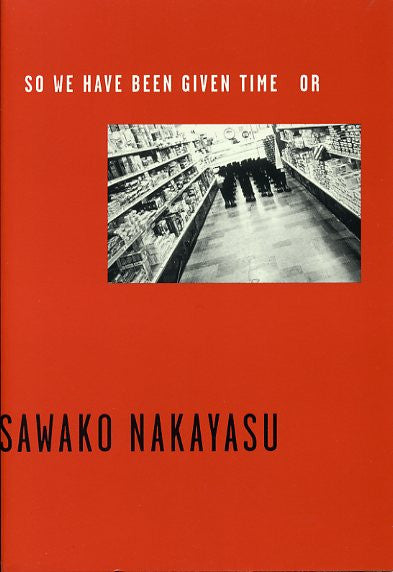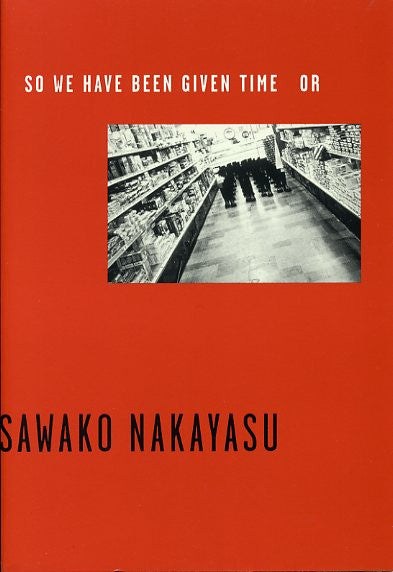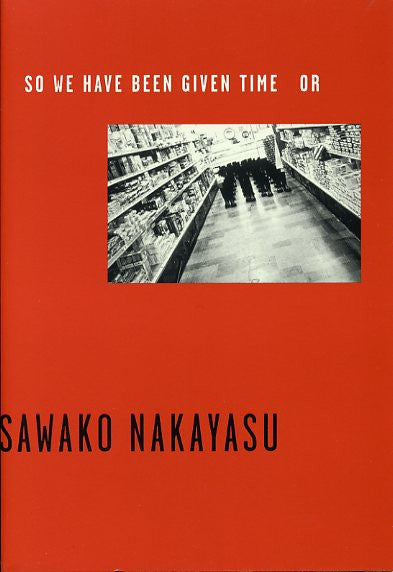
So We Have Been Given Time Or
So We Have Been Given Time Or
-
Nakayasu’s book-length poem uses its tumbling dramatic form to create a new inquiry into “character,” “time,” “place,” “direction,” and other elements. Lyrical language and personal, engaging voices take the reader on a dizzying and affecting journey through a “geography of risk.” This wholly original work brings poetry into regions hitherto explored only by the most experimental forms of music and plastic arts.
Winner of the 2003 Verse Prize, selected by Ann Lauterbach -
What makes this book brilliant is that Nakayasu obviously has a very different idea of what a poem, or poetry, is. While this idea is perhaps more easily identifiable by what it is not—not formulaic, not precious, not belonging to a “school” or regional style—it most assuredly is inventive, quirky, daring, and intelligent. Nakayasu has a generous and novel approach to meaning. As this book spins, shifts, and turns, it never ceases meaning. In fact, Nakayasu means deliberately, almost profusely, as she travels with language to places it has seldom seen before; and it is language itself that emerges in the end, vividly transformed.
Laura Wright, American Book Review
So We Have Been Given Time Or guards the tenuous moments in which the poet clutches the end of each line to ground the right words. Nakayasu tenuously constructs this book on its own terms and lets go of these terms to allow “breaking everywhere.” Let’s keep Artaud for one last moment:“Neither humor, nor poetry, nor imagination means anything unless, by an anarchistic destruction generating a prodigious flight of forms which will constitute the whole spectacle, they succeed in organically re-involving [us], [our] ideas about reality, and [our] poetic place in reality.” As readers, we take it all in: the pain of always “bordering on meaning”; the pleasure of being “seduced by the lovely and the magical”; the gift and “dear-light” of Nakayasu’s poetry.
Craig S. Perez, Rattle
Incongruities and retrofittings provide Nakayasu with her comic material. The book’s keen social observations seem a natural extension of its own balance and ratio, qualities which grow out of the book’s catalogue form and the rhythm that structure affords. It’s a rhythm easily tilted when Nakayasu breaks habit and doubles something, such as adverbs in the line “desperately inhaling deeply via a cigarette.” The adverbs push for notice, but sitting the preposition “via” next to cigarette demonstrates how finely attuned Nakayasu is to the determinative role size assumes in our daily communications. Here, the improbability of this usage reminds us of several assumptions surrounding the scope of “via” and provides a pretty sharp jab at the cycling rhythm of the poem, a moment of self-consciousness that feels like the poet coming up for air.
Paul Klinger, CutBank
-
Sawako Nakayasu is an artist working with language, performance, and translation—separately and in various combinations. She has lived mostly in the US and Japan, briefly in France and China, and translates from Japanese. Her books include Some Girls Walk Into The Country They Are From (Wave, 2020), Pink Waves (Omnidawn), The Ants (Les Figues Press), and the translation of The Collected Poems of Chika Sagawa (Canarium Books), as well as Mouth: Eats Color—Sagawa Chika Translations, Anti-translations, & Originals (reprint forthcoming, Wave Books), a multilingual work of both original and translated poetry. She is co-editor, with Eric Selland, of an anthology of 20th Century Japanese Poetry (forthcoming, New Directions). She teaches at Brown University.
Publication date: October 1, 2004
ISBN# 9780974635309 (5.5x8 96pp, paperback)
Couldn't load pickup availability


